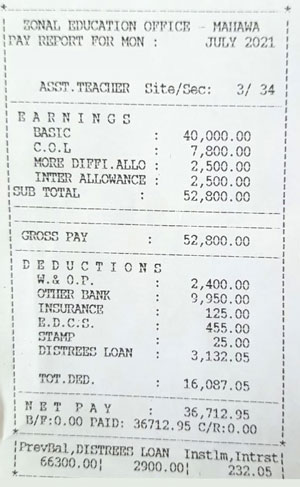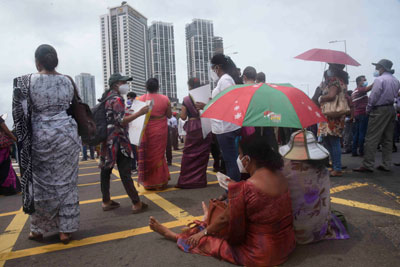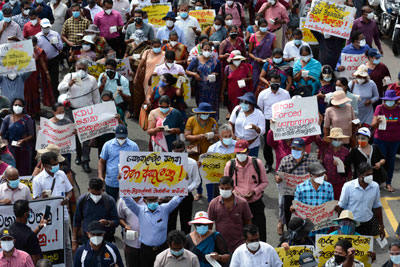News
Teachers fed up with being on bottom rung of salary ladder

Vimal Wijeratne: Principal from Anamaduwa
Parents and students continue to struggle following the sudden absence of teachers from online teaching for close on two weeks but teachers say they have been waiting too long for salary increments the Government has failed to grant.
“Please note that online classes will not be held today,” “Sorry today’s class will not be conducted” were common messages sent to parents from teachers through their WhatsApp groups as most government school principals and teachers stayed away from online studies amidst failed discussions with education authorities and Presidential Secretariat officials this week.
“Towards the third term, schools tend to rush to complete syllabuses. We understand students and parents are struggling but we didn’t have a better time than this to bring up the salary issue that has been ignored by authorities for about two decades and was promised to be solved by this government,” Ceylon Teacher Services Union General Secretary, Mahinda Jayasinghe, said.
“After 11 months, we were able to meet the minister for the first time this week,” he said.
The problem is affecting the 4 million government school students around the country. The strike takes in almost 250,000 teachers.
Frustrated teachers took to the streets this week, refusing to accept Education Minister Prof. G.L. Peiris’ general offer of salary redress through a cabinet paper. Thursday’s protest march in Colombo attracted thousands of principals and teachers amidst a pandemic.
Mr. Jayasinghe said teachers are being paid low salaries averaging Rs. 40,000 a month.
The starting salary of a graduate/teacher training college teacher (Grade III (I)) is about Rs. 32,200. A teacher with about 10-15 years’ experience receives Rs. 35,000-42,000.
A Grade I teacher with about 35 years of experience can earn Rs. 65,000 and a Grade 1 Principal about Rs. 70,000.
“About 40 percent of the student population participates in online education, and most teachers conducted classes voluntarily, with some buying phones and data cards for their students,” Mr. Jayasinghe said.

Salary slip of an assistant teacher
“There was no allowance or support from the Government,” he claimed.
“Even now,” he added, “both students and teachers are struggling with network issues, lack of student participation and paying bills [connected with online learning].”
Apart from online teaching, teachers are also threatening to stay away from Ordinary Level practicals for aesthetics subjects that are to commence on Monday. They also refuse to participate in accepting Advanced Level examination applications.
Thursday’s protest march followed the teachers’ rebuff of Education Minister Prof. G.L. Peiris’ unspecific offer to submit a cabinet paper proposing salary increments. Afterwards, the minister offered more details.
“The Education Minister has now assured us he would submit a cabinet paper this coming Monday, followed by a discussion with teacher/principals associations on Tuesday and a meeting with President [Gotabaya] Rajapaksa at the end of the week. Until then, we will continue to stay away from online teaching until the salary issues are addressed. This should not be just a promise or proposal,” CTU President Joseph Stalin, who led recent protests against salary anomalies and the proposed Kotelawala Defence University bill, warned.
Mr. Jayasinghe placed importance on an intervention by President Rajapaksa. “We have requested a meeting with the president as several of our earlier pleas for salary increments have been rejected by the Salaries and Cadre Commission. We need the Executive to give the order to increase our salaries,” he said.
A teacher from Embilipitiya National School in Ratnapura, Chaminda Jayalath, said most students at the school were not attending online classes due to lack of network coverage or inability to afford a phone or other device.
“We either want the children to be back in schools, or see them them all having access to online education,” Mr. Jayalath said. In the absence of either factor, syllabuses could not be covered.
Geeth Manawamithra, an Advanced Level chemistry teacher from Godakawela, Ratnapura, said despite being in service for 17 years, a Grade 1 teacher, and having a BSc, MSc, other postgraduate qualifications, his basic salary was Rs. 48,955.
“I have never participated in trade union action before but now it is frustrating to see the treatment the teaching service is getting,” he said. “Therefore I decided to stay away from teaching online but I continue to help students who call or send me messages.”
A teacher from Kandy who asked for anonymity explained her decision to join the strike. “From buying phones to data cards, or going to places looking for a good signal, teachers are having a difficult time, especially with primary classes, where getting children to come online is no easy task,” she said.
“We cannot always be in the lower strata of government servants with these meagre salaries,” the teacher said.
Sundaralingam Prakash of the CTSU (Jaffna district) said teachers in the north were also fed up with low salaries and trying to solve problems with online teaching such as inadequate equipment for teachers and faulty network coverage.
“Very few students are attending online classes due to poverty and a poor signal. There is no equality in education,” Mr. Prakash said.

Thursday's protest march in Colombo attracted thousands of principals and teachers amidst a pandemic. Pix by Akila Jayawardana
Vimal Wijeratne, a principal from Anamaduwa representing the Principals’ Union, said another grievance was that the vehicle permit given to Grade I principals had been scrapped a few years ago.
Worried parents want the whole problem solved quickly for their children’s sake and also because of the extra workload for them.
“The online education system has collapsed due to the teachers’ strike. This happened at a time when schools were rushing to complete syllabuses,” a parent in Galle said, asking to stay anonymous.
“Unlike school hours, online studying was going at a slow pace, with just an hour or few hours a day. We are worried that students will go into the next year with incomplete studies,” said the parent, urging authorities to settle the issue as soon as possible.
“I have three children. Although teachers are not going online to teach, they are giving out homework, and this has been really tough for parents,” a parent in Colombo, Thilini Dharshika, said.


